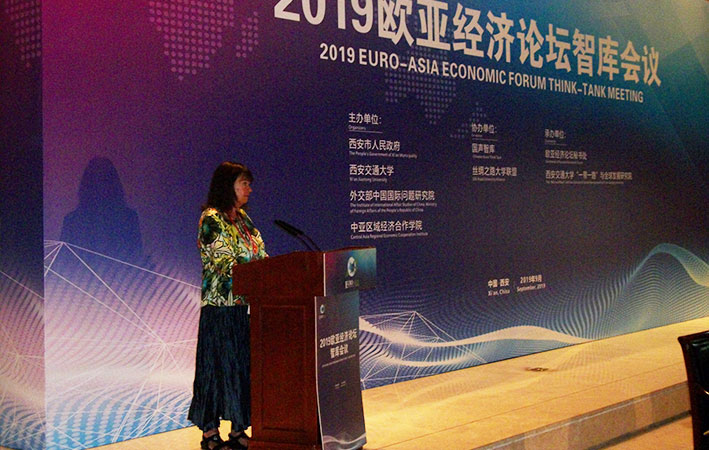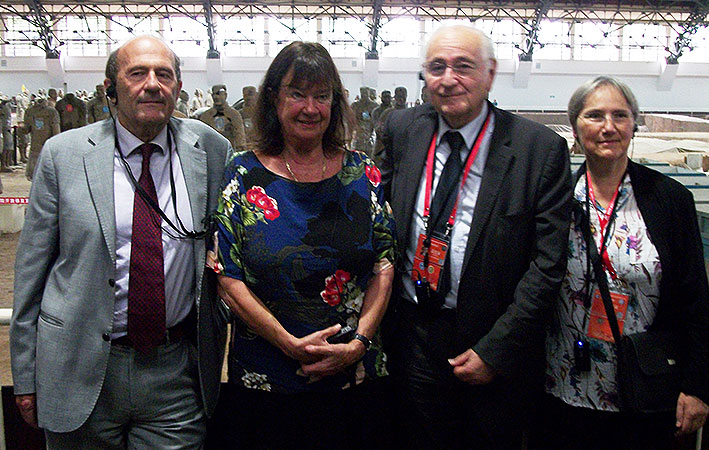It Is Time That Man Grew Into a New Paradigm
On December 28, 2019 the Schiller Institute participated in the third annual memorial in honor of the Alexandrov Ensemble, at the Tear Drop Memorial in Bayonne, New Jersey. In 2016, 64 members of the Alexandrov Ensemble, along with 24 others, perished when their plane crashed into the Black Sea en route to Syria. What follows is a transcript of the memorial including remarks from Capt. Donald Haiber, Father John Fencik, Chief Keith Weaver, Deputy Permanent Representative of the Russian Federation Mission to the United Nations Mr. Dmitry Chumakov, Deputy Permanent Representative of the Syrian Arab Republic Mission Dr. Louay Falouh, Schiller Institute Founder Helga Zepp-LaRouche, founder and Co-Director of the Schiller Institute New York City Chorus, Diane Sare, and Mr. Kevin Maynor.
Transcript of ceremony:
Capt. Donald Haiber, Bayonne, N.J. Fire Department: First I want to wish everyone a belated Merry Christmas. Secondly, for those of you that have been with us for the last few years, it looks like we lucked out with some balmy weather. I know it’s been cold and snowing in the past, but today looks like a beautiful day, and it’s a nice way for a remembrance.
Some of the people who are here today, we have our Office of Emergency Management Director Mr. Ferantay [ph], the chief of the department Keith Weaver; we also have the Deputy Permanent Representative of the Russian Federation Mr. Dmitry Chumakov; and also, I’d like to recognize the Deputy Permanent Representative of the Syrian Arab Republic, Dr. Fallouh. And also a very special thank to Mr. Kevin Maynor, who’s behind me. I also want to recognize Father Fencik: He’s been here every year with us, braving the cold. And the last person I want to thank is the Co-Director of the Schiller Institute New York Chorus Diane Sare, who, without her, none of this happens.
On behalf of the Bayonne Fire Department and the City of Bayonne, we welcome you all to today’s ceremony. Father Fencik, would you please do the invocation?
Father John Fencik: In the Name of the Father, and of the Son, and of the Holy Spirit, Amen. O Heavenly King, the Comforter, O Spirit of Truth, Who everywhere present through all things, Treasury of Blessings and Giver of Life, come into all within us, cleanse us of all stain, and save our souls, O Gracious Lord.
This is the prayer that is traditionally said at the beginning of any type of function that involves the Russian people. We pray that we who are gathered here today, in memory of those departed members of the Alexandrov Choirs, those who departed with them this life in December of 2016. We pray that God give them eternal rest in His heavenly mansion. We pray that this ceremony retains their memory, and brings them all to life everlasting. Amen.

Color Guard posts colors. Chorus presents the Russian Federation National Anthem and United States of America National Anthem.
Captain Haiber: Thank you all very much. That was beautiful. I’m going to introduce Chief Weaver who wants to say a few words as well. Professionally, he is my chief, he’s my boss, but I’m honored, personally, to say that he is my friend — Chief Weaver.
Chief Keith Weaver: Good morning to everyone in attendance today. I’m grateful for this opportunity to say a few words in honor of the lives lost on Christmas Day 2016. Today, we pause to remember and honor the tragic loss of Alexandrov Ensemble. The loss of this extremely talented group was a loss for the entire globe. I’m honored to be speaking at this fitting site, as this Tear Drop Memorial was donated to our city from our world neighbors in Russia. The gift is a reminder that although we may be separated by nationality, we are united in humanity. As brothers and sisters, we share in your grief, and also share in your hope for a brighter future for all mankind. May the lives lost on that tragic day, three years ago, rest in peace. Thank you.
Captain Haiber: Thank you, Chief. Mr. Chumakov will have a few words to say.
Dmitry Chumakov: Ladies and Gentlemen, Dear Friends: We are very pleased to welcome all those of you who have joined us today in the memory of the Alexandrov Ensemble, and the victims of the plane crash that happened on the 26th December 2016, just a couple of days from today, three years ago. It was a legendary ensemble, media workers from Russian TV channels, and the famous philanthropist Elizaveta Glinka: They were bringing to Syria, the Christmas mood, they were bringing into a war-torn country, and it was a big tragedy and loss.
The Russian Mission is grateful to the Schiller Institute, to the Fire Department of the City of Bayonne: without you, this event would not be possible. It’s becoming a tradition. We are getting together for the third time now, and this is a great honor for us to share these human feelings and share with you the losses and compassion. This memorial event is a great example [inaudible] honor and solidarity between our countries. The Alexandrov Ensemble has been reinstated, and I just want you to know that the new performers [inaudible] we also want you to know that that humanitarian projects started by Elizaveta Glinka are implemented by her followers. And it’s also important to say that we’re still making a lot of efforts to bring peace to Syria, and to help Syria, and to help the political settlement in this country. So, it is only with political settlement that the problems can be solved.
We once again must give tribute to these brave and merciful people who are our modern-day heroes. They are symbols of patriotism and humanity are given to us today: May their souls rest in peace. And thank you very much for joining us today.
Captain Haiber: Thank you Mr. Chumakov. We are here once again to give our condolences and sympathy to the families of the Alexandrov Ensemble and to the people of Russia. Everyone here proves, I believe, that this small remembrance shows our humanity towards one another — and God knows, we could use more of that.
Once again, it’s fitting that we’re here at the Tear Drop, because the creator of this structure was the Russian sculptor Zurab Tsereteli. In the darkness after 9/11, this monument helped to bring peace and the light of hope to the many people [inaudible] here. We now wish to pay that forward, back to the Russian people and the families of the Alexandrov Ensemble.
May the serenity and hope that I feel when I am here be conveyed back to the people of Russia. Music has meaning, and this quote from Billy Joel conveys that better than anything I could ever say: “I think music in itself is healing. It’s an explosive expression of humanity. It’s something we are all touched by, no matter where we are from, everyone loves music.” It is times like this that we are neither Americans nor Russians, nor Syrians, but we are just human beings who genuinely wish peace and happiness to one another.
Once again, I will try to convey my thoughts in Russian. I’ve been practicing and hopefully this gets it through: [Russian remark].
It is now my honor to introduce Mr. Kevin Maynor. He has sung with the Metropolitan Opera, the Lyric Opera of Chicago, and many others. Mr. Maynor was the first apprentice artist from the West to study at the Bolshoi in Moscow, where he studied and sang. He will now also share a few words with you.
Kevin Maynor: Thank you. [Sings Russian folk song “Still One Star”] I don’t think anybody can talk about the Alexandrov Ensemble, the great Russian Army Chorus, and not think of the great [inaudible] that was meant to encourage, sung by the Volga boatmen. I think of the Volga boatmen and the Volga River, which I had the pleasure of seeing in the year 2000-2001 upon my return to Russia. My first experience of 1979-1980, and the Russian people embraced me with a certain kind of love that I will never, ever forget. I love them dearly, from the bottom of my heart. There’s no bass in the world — no bass in the world — no singing bass, that does not admire the training and the beauty of the great Russian basses and the great Russian singers. I think these people and the contributions they have made to the world, regardless of the confusions and the politics that might be involved between countries, one thing for sure, music, it is true, it is the healing source. It is the language that we all speak and understand. And when we don’t understand one another, we learn to appreciate, which is the key, actually, to bringing people closer together, appreciation for one another.
I want to take the time to sing for you a spiritual, one that was sung by the great Paul Robeson, who was a great singer, one that many admire — certainly the Russian people admire. He sang this song amongst them, and I want to sing it for you all: It’s called There Is a Balm in Gilead.
God bless the Alexandrov Ensemble. God bless their mission. God bless all of you who are gathered here, today.
Captain Haiber: Thank you Mr. Maynor. I do have to say, that is probably the most beautiful thing I’ve ever heard. Thank you.
Helga Zepp-LaRouche: I extend my greetings to all of you gathered today to commemorate the lives of the 92 passengers and crew, who died when the Russian TU 154 crashed into the Black Sea on December 25th, 2016. Sixty-four singers of the Alexandrov Ensemble, plus the crew of the plane, members of the Russian military, Russian journalists and the beloved relief worker Dr. Elizaveta Glinka all perished that winter night, while flying to give Christmas comfort and cheer to soldiers who were battling to liberate Syria from the terrorist scourge of ISIS.
Each of the people on that plane was like the Good Samaritan that Schiller writes about in his Kallias essays On the Beautiful. In Schiller’s story, several people stopped by the side of the road to help the injured man, but some asked for money, some wanted recognition, and to put down others who didn’t stop; but only one person stopped, and very naturally and happily put down his own load, to carry the injured man without a second thought for himself.
In 2020, the world will celebrate the 75th anniversary of the defeat of the Nazi terror in May of 1945. At that time, people vowed, “Never Again!” And now, 75 years later, mankind again is threatened with the danger of cultural decadence and even potentially a great war. As Schiller said, it is only through aesthetic education through great classical art that the ennoblement of man can occur. It is time that mankind grew into a new paradigm where, as Shelley and Schiller proposed, the poets and artists become the natural leaders of the age.
Diane Sare: Good morning, now speaking on behalf of the Schiller Institute NYC Chorus, I would like to say that a chorus is a very special thing. It is a group of diverse individuals, who discover through the art of a great composer that their diversity becomes their strength.
Our chorus had existed for just two years when I received the news on Christmas Day 2016 of the crash of the Red Army Chorus, and it was like getting punched in the stomach. Some of us quickly enlisted the help of a Russian-American chorus member to pronounce the words to the Russian National Anthem, and we went to the Consulate and sang it outside on the sidewalk.
I learned that the NYPD Ceremonial Unit had been deeply moved by the Ensemble at the Military Bands Tattoo in Quebec City in 2011, which had happened to fall on the 10th anniversary of the 9/11 attacks. A wonderful baritone, Grigory Osipov sang God Bless America, which they performed as a gift to the NYPD Ceremonial Unit, and a young boy came and presented the director, Lt. Tony Giorgio, with a single white rose. You will see Osipov’s name on the list of those who perished in that terrible crash.
The United States, Russia, and Syria have all suffered the devastating effects of terrorism, but I am optimistic that perhaps the warm weather here this year may be a sign of the warmth of the friendship that our nations and peoples may share in our musical dialogue.
Father Fencik: The Church teaches us that as long as we keep a person’s memory alive, they are still with us. It is traditional at the end of any memorial service that the hymn Eternal Memory is sung, and the Russian hymn. So we will conclude this memorial service with the prayer for the departed and the singing of the memorial hymn.
O God of spirits and all flesh, who has conquered Satan and vanquished death, and granted life to your world, Lord give rest to the souls of your faithfully departed servants. in a peaceful, serene place, from which all pain and sorrow and sighing are absent. As the good and gracious God Who loves mankind, forgive all transgressions committed by them in word or in thought, voluntarily as a human frailty. There is no man living who does not sin. You alone are without sin. Your truth is truth for eternity, your word alone reality. For you are the Resurrection, the Life and the Repose for your departed servants, Oh Christ, our God. We rend You glory together, Eternal Father, holy gracious and life-creating Spirit, always now and ever, and forever. Amen.
In blessed repose grant eternal rest, Oh Lord, to the souls of Your departed servants. Make eternal their memories, Vechnaya pamyat! [Eternal memory!]
























